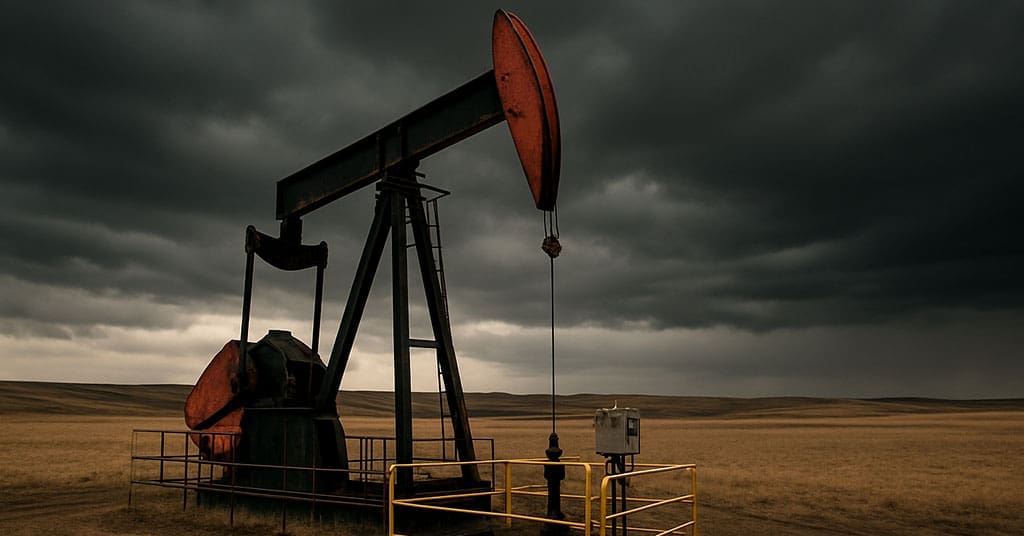Falling oil prices, growing oversupply and rising recession fears are hitting Canada’s energy sector hard and dragging down the country’s economic outlook
Global crude oil markets are entering a dangerous phase, and oil-rich Canada, the world’s third-largest producer, is caught in the crossfire.
Warning signs are flashing everywhere. Recession fears are mounting. Oil demand is softening. Global supplies are swelling. Together, these forces threaten to inflict serious long-term damage on Alberta’s energy sector and Canada’s broader economy.
At the heart of the crisis are chaotic trade policies and rising protectionism. U.S. President Donald Trump’s escalating tariffs have thrown the global economy into turmoil. Last week, the International Monetary Fund slashed its forecast for global growth to 2.8 per cent this year, down from the 3.3 per cent predicted just a few months ago. U.S. growth projections were cut even more sharply—to 1.8 per cent from 2.8 per cent.
As global trade slows under the weight of tariffs, so does the demand for oil to fuel factories, ships and supply chains.
“We’re entering a new era as the global economic system that has operated for the last 80 years is being reset,” said Pierre-Olivier Gourinchas, the International Monetary Fund’s (IMF) chief economist, in a news conference. “Beyond the abrupt increase in tariffs, the surge in policy uncertainty is a major driver of the economic outlook,” he added. “If sustained, the increase in trade tensions and uncertainty will slow global growth significantly.”
Unless there is a dramatic course correction, recession—or even depression—is no longer a distant threat. It is looming. Earlier this month, Goldman Sachs warned that benchmark oil prices could sink to US$50 a barrel by the year-end if the trade barriers result in a global recession. Morningstar DBRS echoed the concern: “The impending global economic slowdown—largely centred on the U.S. and China—will potentially have a significant negative effect on crude oil demand.”
Energy markets are already reacting. Fatih Birol, executive director of the International Energy Agency, points to a widening imbalance. “This year, we expect the oil demand to increase about 700,000 barrels per day, and the production growth is significantly higher than that,” told Bloomberg Television. “If there are no other surprises, we may expect oil prices to see further downward pressure,” Birol added.
Deloitte’s latest oil and gas price report also points to a worsening outlook, calling for West Texas Intermediate (WTI) to average US$68 per barrel in 2025, US$66 in 2026 and US$65 in 2027. In December, it forecast US$70 in 2025, and US$68 in 2026 and 2027. “Oil demand could be stressed by an economic slowdown coupled with increasing energy costs,” Deloitte wrote.
While demand struggles, supply pressures are intensifying. Despite a steep drop in prices, OPEC+ members are proposing a second consecutive output increase in June after an unexpected surge in May. According to Reuters, several countries within the group are pushing for higher quotas.
April saw oil prices fall to four-year lows, battered by the U.S.-China trade war and OPEC+’s surprise decision to raise output by 411,000 barrels per day—three times more than planned. Saudi Arabia led the push for higher production, reportedly angered by Iraq and Kazakhstan exceeding their quotas, but also possibly to help Trump deliver lower U.S. gasoline prices as promised in his election campaign.
Meanwhile, potential peace talks in Ukraine could allow more Russian oil to flow onto world markets, adding to the glut.
The result: a triple blow—weakening demand, surging supplies and worsening geopolitical uncertainty—hammering oil markets into submission.
The energy sector is not just a regional story—it contributes about 10 per cent of Canada’s GDP, funds vital public services and supports hundreds of thousands of jobs across the country. A wounded energy sector would mean lost jobs, lower public revenues and a weaker economy at a time when resilience is desperately needed. The global oil war is no longer a distant drama. It is already at our doorstep.
Toronto-based Rashid Husain Syed is a highly regarded analyst specializing in energy and politics, particularly in the Middle East. In addition to his contributions to local and international newspapers, Rashid frequently lends his expertise as a speaker at global conferences. Organizations such as the Department of Energy in Washington and the International Energy Agency in Paris have sought his insights on global energy matters.
Explore more on Canadian economy, Alberta’s Business, Energy sector, World economy
The views, opinions, and positions expressed by our columnists and contributors are solely their own and do not necessarily reflect those of our publication.
Troy Media empowers Canadian community news outlets by providing independent, insightful analysis and commentary. Our mission is to support local media in helping Canadians stay informed and engaged by delivering reliable content that strengthens community connections and deepens understanding across the country.




